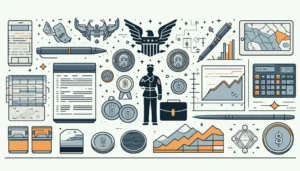Getting ready for changes on how you produce income
I recently listened to a thought-provoking podcast interview from McKinsey Consulting about the future of work. It was based on a recent report on the projected impact of automation on the nature of work by the year 2030. Further digging revealed a very interesting global discussion that is now underway on what work may look like in the coming decades.
I also found an increasing number of discussions in the ChooseFI ecosystem about the value of advanced education and ideas on multiple streams of income. Putting all of this together, I wondered:
“What is the future of work and what does this mean for someone on the path to financial independence (FI)?”
Impact of the Future of Work on Income
It’s important to first highlight that work does not necessarily mean income. What do I mean by this? While many of us bring income into our lives through a job or career, there are other ways to achieve income such as through real estate, earnings from investments, sales from your side hustle etc.
When we think about the future of work, it will apply to our “9-5 job”, including what jobs will be available, which will no longer be relevant, as well as the individual tasks and activities that make up a job. In addition to having an impact on jobs and how we work, these large-scale changes will likely have broad implications to our other streams of income.
The world is changing leading to shifts in the way we work
There are many aspects of culture, technology, economy and environment that are changing at a very fast pace. Several of these changes have been identified as drivers or catalysts for major shifts on how we live and work. These include:
Changing Demographics:
Over the next 25-30 years we expect to see the continuing rise of incomes and prosperity around the world–particularly in countries currently viewed as emerging markets or low to middle income i.e. India, China, Nigeria. For example, it has been estimated that another one billion people will be entering the consuming class over the next few decades! In addition, in many countries a large proportion of citizens are getting older i.e. Japan, Germany, Italy, U.K, Canada, and USA. Both of these trends will likely have tremendous impacts on economies, such as more people being able to buy stuff and the need for goods and services directed at older folks, such as healthcare.
Globalization:
There is an ever-increasing integration and connection between countries. This includes trade and legal frameworks, transportation and communication networks. Globalization is having an affect on how goods and services move across geographies, as well as how ideas and cultures are becoming more connected. This is already having profound impacts on economies and labour markets, including jobs moving from one country to another and the rapid spread of ideas and technology.
Advances in Technology:
As technology progresses and becomes more sophisticated, automation is allowing for an increasing number of tasks traditionally performed by humans to become automated. At first, these will likely focus on tasks considered more easily automated such as some clerical and basic paralegal work (in fact, this is already starting to happen). However, with artificial intelligence and the availability of ever increasing computing power, more complex tasks are also likely to become automated. One telling statistic estimates that for about 60% of current occupations, at least one third of the activities associated with these jobs could be automated with current technology.
Introducing…The Fourth Industrial Revolution
Together, these global trends are likely to cause dramatic changes in the way we work. In fact, some reports suggest that this will be more profound than our shift away from agricultural or manufacturing based economies. The term “Fourth Industrial Revolution” has been used to describe this new era, with the way we work being only one part of it. There is great potential for the Fourth Industrial Revolution, including a shift in economic and societal structures enabling a focus on the world’s well being. Not just more stuff for more people, but a way that we can reduce inequalities and have a diverse, safe, just and healthy world. Awesome!
“The Fourth Industrial Revolution is about more than just technology-driven change; it is an opportunity to help everyone, including leaders, policy-makers and people from all income groups and nations, to harness converging technologies in order to create an inclusive, human-centred future. The real opportunity is to look beyond technology, and find ways to give the greatest number of people the ability to positively impact their families, organisations and communities” World Economic Forum
Why does this matter for our journey to FI?
Of course, the only thing that we can be certain of when thinking of the future is that nothing is certain! So what does this mean for our journey to Financial Independence (FI)? As you know, to reach FI there is a simple formula that we can think about –> Maximize net funds and minimize time to get there. And how do we do this? By maximizing income and minimizing expenses.
With these changes to the nature of work, our FI journey will be impacted primarily on the income side including:
- The 9-5 job: Occupation choice and availability, as well as the nature of specific jobs
- Opportunities for investments: Emerging and growing industries (e.g. clean energy, biotechnology)
- Opportunities for side hustles: Pivoting to meet changing consumer demographics and needs
What else matters for the future of work and FI?
As we think about these upcoming changes to the future of work, there are some context pieces that you might want to think about:
It matters where you live: It seems that these large global trends will play out slightly differently depending on where you live. This is because some parts of the world are considered more established economies where as others are at different stages of development and industrialization. This means that some countries may be shifting to the 4th Industrial Revolution before they’ve had a chance to let the 3rd version fully play out. Also, the proportions or make up of different industries or sectors of work will matter. For example, those places with a high proportion of work in routine manufacturing will likely experience big changes with the integration of automation versus those areas that already have most of their workers skilled to take on this new way of working.
It matters if/how our countries, regions, cities are thinking about this: This could be a very exciting and positive new era for us. However, it does depend on how prepared and open policy makers, industry, government and individuals are to take on these changes. In addition, it will matter if we can take on ‘blue sky thinking’ and see if we really can move towards a world that meets all of our basic needs and allows all of us to achieve real happiness and well-being. (Hey! Isn’t that why we are all trying to reach FI anyways? Can you imagine if there was a way for all of us to get there?)
It matters about the skills and competencies we develop: There will be some new skills and abilities that our children and we will need to meet these changes. This will include thinking about what we as humans can do that automation cannot do. Creative and design work? Intuitive and abstract thinking? We will have a chance to dig into this a little more in my next post.
So, what will this mean for income and the FI journey?
Friends, not all is doom and gloom! Change can be good. It seems like there may be some cool opportunities ahead for us. Here are a few things to consider when thinking about your future and generating income for FI:
There will still be lots of work available: Some jobs will fade away and others will emerge. For the most part it’s thought that there will not be a decrease in the number of jobs available but a change in the nature and type of jobs instead.
More people able to buy stuff: With the expanding consumer class there will likely be more people interested in purchasing your goods or services. So no shortage of happy shoppers out there!
Changes to types of goods and services that people want: Many places have already started to see dramatic shifts in age, culture and ethnic make up of their communities. This means that there are opportunities to provide goods and services that are more reflective to our changing society. For example, with an aging population there may be a change in consumer tastes from durable goods (such as cars) towards services (such as health care).
More work via the Platform Economy: This is what we have heard about on several ChooseFI podcast episodes related to blogging and making money online (refer to podcasts 69R and 73R). More broadly, this ‘platform economy’ allows for jobs to be broken down into a set of smaller tasks. This creates opportunities for side hustlers and even full time workers to take advantage of freelancing to produce income. This also includes things under the ‘gig’ economy such as AirBnB and Uber. Going forward, we may see even more of this kind of work so that folks can take advantage of the flexibility and extra income that this kind of work affords.
Better able to match work and workers: It is suggested that advances in technology are going to help facilitate new and more efficient ways of matching the demand for and supply of labor. There has often been a disconnect here and going forward, more jobs might be available because there are better ways for employers and employees to find each other.
Summing it up
So, this could be the dawn of a new era. With our entrepreneurial and ‘go getter’ FI spirit, I know that we can adapt and thrive in this new era. And even more, my hope is that the FI community can be a part of realizing the aspirational new world that can be happy and healthy for all of us!
Points to Ponder
For discussion–are you starting to see any of these changes playing out in your community,industry,work place? What do you think might be the impact on your journey to FI?
Resources
The discussions on the Fourth Industrial Revolution and the future of work are super interesting. Check them out if you would like to learn more:
The Organisation for Economic Co-operation and Development (OECD)
“Future of Work and Skills.” Paper presented at the 2nd Meeting of the G20 Employment Working Group. 15-17 February 2017, Hamburg, Germany
“How will automation affect job, skills and wages.” (podcast) Peter Gumbel, Michael Chiu, March 2018
“What is the Future of Work?” (podcast) James Manyika, December 2017
“What the future of work will mean for jobs, skills and wages.” (report) James Manyika, Susan Lund, Michael Chui, Jacques Bughin, Jonathan Woetzel, Parul Batra, Ryan Ko, and Saurabh Sanghvi, November 2017
“The Fourth Industrial Revolution: what it means, how to respond.” Klaus Schwab, Founder and Executive Chairman. World Economic Forum Geneva, 14 January 2016




